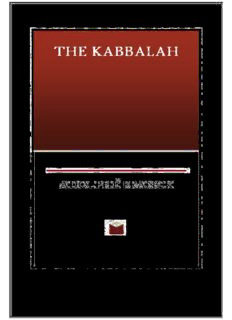
The Kabbalah PDF
Preview The Kabbalah
THE KABBALAH OR THE RELIGIOUS PHILOSOPHY OF THE HEBREWS BY ADOLPH FRANCK REVISED AND ENLARGED TRANSLATION BY DR. I. SOSSNITZ 1926 The Kabbalah by Adolphe Franck. This edition was created and published by Global Grey ©GlobalGrey 2017 globalgreyebooks.com CONTENTS Preface To The English Translation Preface To The German Translation Of The First French Edition Foreword To The Second French Edition Preface Of The Author Introduction PART ONE Chapter 1. The Antiquity Of The Kabbalah Chapter 2. The Kabbalistic Books. Authenticity Of The Sefer Yetzirah Chapter 3. The Authenticity Of The Zohar PART TWO Chapter 1. The Doctrine Contained In The Kabbalistic Books. Analysis Of The Sefer Yetzirah Chapter 2. Analysis Of The Zohar. Allegorical Method Of The Kabbalists Chapter 3. Continuation Of The Analysis Of The Zohar. The Kabbalists' Conception Of The Nature Of God Chapter 4. Continuation Of The Analysis Of The Zohar. The Kabbalists' View Of The World Chapter 5. Continuation Of The Analysis Of The Zohar. View Of The Kabbalists On The Human Soul PART THREE Chapter 1. Systems Which Offer Some Resemblance To The Kabbalah. Relation Of The Kabbalah To The Philosophy Of Plato Chapter 2. Relation Of The Kabbalah To The Alexandrian School Chapter 3. Relation Of The Kabbalah To The Doctrine Of Philo Chapter 4. Relation Of The Kabbalah To Christianity Chapter 5. Relation Of The Kabbalah To The Religion Of The Chaldeans And Persians Appendix DEDICATED TO THE MEMORY OF MY UNFORGETTABLE TEACHER AND FATHER JOSEPH L. SOSSNITZ GREAT KABBALIST, THOROUGH SCIENTIST, TRUE PHILOSOPHER AND INDEFATIGABLE SEEKER FOR. TRUTH IN HUMBLE DEVOTION THE TRANSLATOR THE SEPHIROTH AND THEIR INTERRELATIONS 1 PREFACE TO THE ENGLISH TRANSLATION It would be presumption on my part were I to follow the example of the German translator and write a lengthy preface on the merits of this book. It would be but a poor imitation, at best. Any one willing to take the trouble to study the biography of the author and his German translator will admit that the devotion to impassionate philosophy of the one and the intimate acquaintance with Talmudic lore and Jewish Religious Philosophy of the other justly grant them undisputed authority to speak on the subject treated of in this work, and entitle them to a respectful hearing by all those desiring an unalloyed exposition of the Kabbalah. I lay claim to none of these qualifications, and will therefore confine my remarks to the make-up of this translation. My efforts have been directed primarily to a popularization of the subject treated here, and I have therefore avoided, as much as possible, any complicated phrases or obscure expressions often met with in works treating subjects of this or similar nature. My notes are rather of an explanatory nature and tend to enlighten the reader on some points he may not be familiar with. At times, though, I was compelled to take the part of a critic; especially where I met with discrepancies between the French original and the German translation. In such cases I was naturally compelled to look for arbitration in the original sources, and I had to venture my own opinion at times when neither the translation of the author nor that of the German translator seemed to render the true meaning of the original Hebrew or Aramaic text (as, for example, note 15 and note 46 in Part II, Chap. III). I have translated all the notes made by Dr. Jellinek, and followed his example in omitting the translation of the Appendix. His reason for doing so seems to me to be justified. There are English translations of these extracts, and, besides, such diatribes do not contribute to the knowledge of and enlightenment on the Kabbalah with which this work is concerned. I have added, instead, an Appendix by Dr. Jellinek on the "Bibliographical Notices on the Zohar" which, I am sure, will amply repay the reader for my omission of the Appendix of the French text. I 2 have also added an Index for the convenience of those readers who may wish to use this book as a reference. For any inaccuracies and mistakes which may have crept into this translation I ask the indulgence of the kind reader and critic, and I shall ever be thankful for any corrections offered in good faith. The task of translating was to me by no means an easy one; for the work developed mostly during the minutes snatched from an often busy practice, and during the hours usually assigned to physical and mental rest--from midnight to dawn. I. SOSSNITZ. New York, May, 1926.
Description: